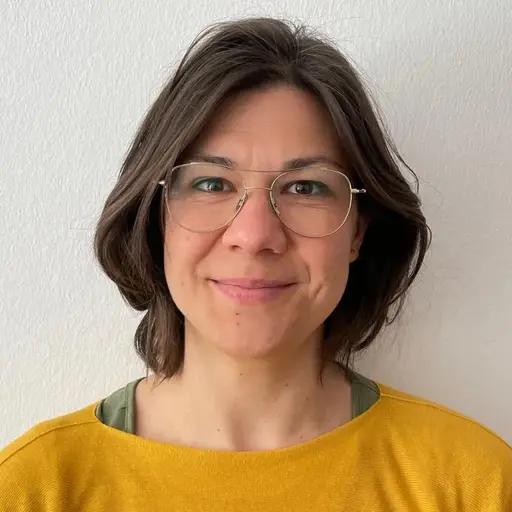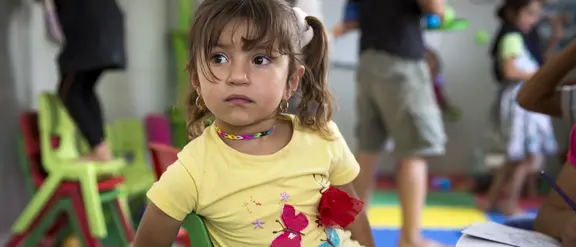Traumatic events such as violence, war, or natural disasters, as well as humiliation and social injustice, can traumatize children and young people. Terre des Hommes provides trauma support for children and young people, helping them find their way back to life.
Your donation helps!
Projects
Children have a right to mental health
Traumatic events such as violence, war, or natural disasters, as well as humiliation and social injustice, can traumatize children and adolescents. Traumatic events can be single occurrences, short-lived or long-lasting, or recurring. Chronic stress, loss, and domestic violence can also severely impact mental health and, if left unprocessed, can lead to lasting inner wounds. Entire societies can also experience trauma, for example, when colonialism destroyed social structures and created inequalities that profoundly affected people's lives across generations.
Refugee children and young people often witness or experience severe violence at a very early age. They face threats, persecution, exclusion, war, and the death of family members. Many experience imprisonment, mistreatment, and torture in their country of origin and during their flight. Even in their host country, they frequently encounter everyday racism and structural discrimination, and are often denied their rights in education, asylum procedures, or healthcare.
Children and young people do not always experience violence and distressing situations directly, but often indirectly, for example through witnessing them. Even if they are not directly present, children often perceive what has happened, as they usually notice even the slightest changes in their caregivers.
How does trauma develop?
In situations where survival is real or perceived to be in danger, the human body and mind react with a strong state of alarm. Existential threats can trigger helplessness and/or fear of death, shaking one's understanding of self and the world. The body enters fight-or-flight mode to escape the danger. Freezing is also a possible reaction. Children and adolescents who have experienced potentially traumatic events are survivors. They bring with them skills and experiences. Not everyone who has experienced a traumatic event subsequently develops mental health problems. A stable social environment, secure attachments, a protective family, one's own resilience, and external support can have a protective effect.
However, the traumatic events can have a lasting impact and become deeply ingrained in the psyche. A persistent state of physical and emotional alarm can overwhelm a person. When the memory of the experience persists, we speak of stress-related and trauma-related disorders. These can manifest in a wide range of mental health conditions and significantly impair daily life, for example, in the form of anxiety disorders, depression, or addictive behaviors. They differ in the type and severity, frequency and duration of the trauma, and the individual's coping mechanisms. The most well-known trauma-related disorder is post-traumatic stress disorder (PTSD), which, according to the World Health Organization (WHO), only develops in a minority of those affected. A younger age may increase the risk of developing PTSD after a traumatic experience.
Trauma work and trauma support – What does Terre des Hommes do?
Terre des Hommes works through trauma work and psychosocial support (MHPSS) for children and young people, helping them to move from survival mode – saving themselves and others – to a calmer state, to recover and regenerate.
The younger the person and the less developed their coping mechanisms, the more likely they are to develop potentially distressing after-effects. Young children, in particular, may mistakenly believe they are to blame for what they have experienced. Common symptoms include sleep problems, nightmares, and heightened anxiety, shyness, or nervousness. Older children and adolescents may exhibit learning difficulties, concentration problems, school refusal, and aggressive behavior. Some teenagers keep their feelings to themselves and outwardly pretend everything is fine, which can lead to depression. Parents and other close caregivers who are themselves under stress are sometimes unable to adequately respond to the children's needs and also require support.
As Terre des Hommes we work with our partners to create safe spaces for children and young people where they can simply be children. In our joint projects worldwide, we utilize various approaches and methods of mental health support (MHPSS). We offer children stability, foster connections, and provide a sense of security. We also strengthen their family and social environments, positively impacting their health. We provide psychosocial support within humanitarian aid efforts and during evacuations from war zones. We facilitate needs-based therapeutic services, art therapy, group work, and age-appropriate bereavement support, particularly where these services are lacking. Together with our partners, we also consider societal conditions to advocate for the right of children and young people worldwide to mental health.
Your contact person

Anna Weber
Speaker for the Germany and Europe program

